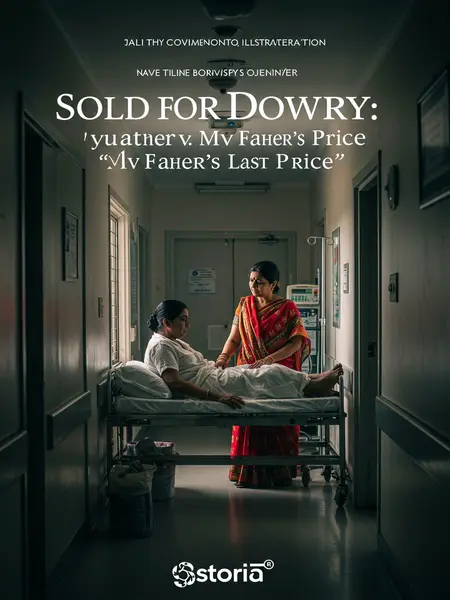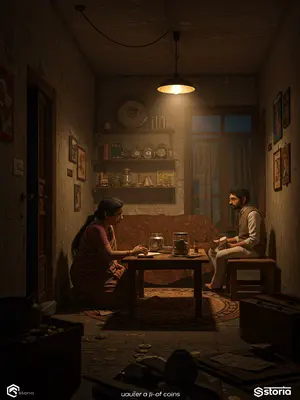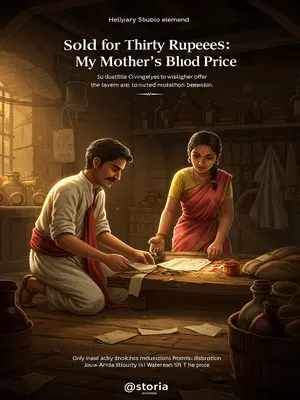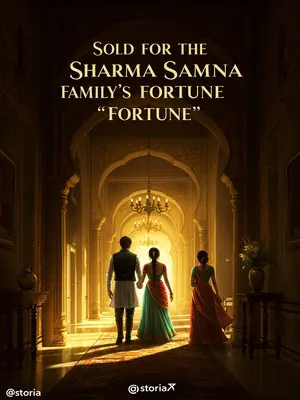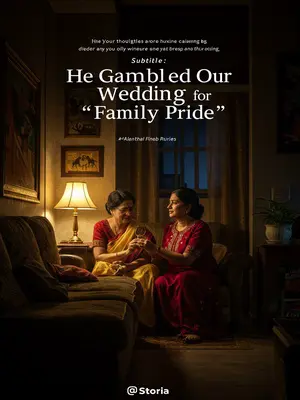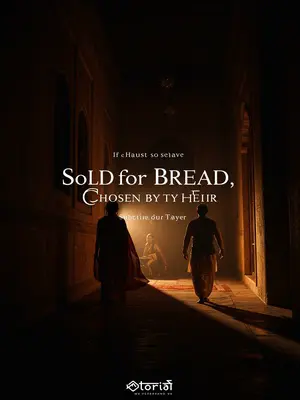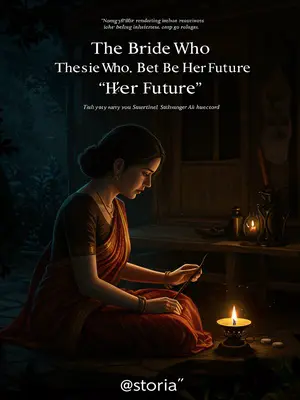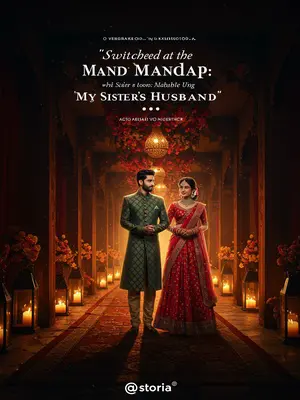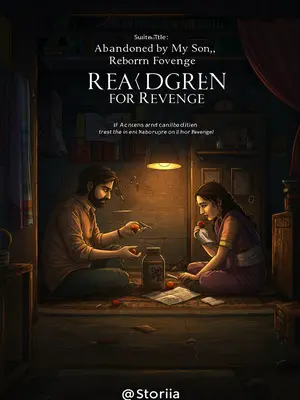Chapter 2: The Price of Love
I settled among a group of aunties, their metallic bangles clinking as they shifted. I couldn’t catch a word of their dialect, but their glances and laughter made my skin prickle. The sticky Godrej sofa pressed against my palm, and from outside, the faint sound of a temple bell mingled with the distant crackle of fireworks.
I tried to sit up straight, clutching my phone for reassurance, catching snatches like, "Arey, kitna kamzor hai," and "Chalo, dekhte hai kya karta hai." My confidence drained away faster than their chai.
Ananya stood across the room, head down, scrolling her phone with tense, rapid thumbs. Her jaw was clenched, shoulders stiff. It hurt that she didn’t come over—couldn’t she offer me a little support in this battlefield?
Just yesterday I’d teased her, “They say sasurji dekhte dekhte damad se bore ho jaate hain. What if your dad beats me up?”
She’d laughed, “Arrey yaar, mere papa tumhe kha nahi jayenge.”
That laughter felt like a distant memory now—a joke that had soured.
Her father cleared his throat, voice cutting through the chatter. “Since you’re already here, main seedha baat karta hoon. Main iss shaadi ke liye haan nahi bolta.”
He made his announcement in front of everyone, his tone loud enough for all to hear. It was like he wanted witnesses for what was coming next.
I managed, “Uncle, par dono families toh sab kuch discuss kar chuki hain?” My hands were cold, my heart a dhol in my chest.
He snorted. “Yeh sab mujhe mat batao. Tumhare gharwale ne dhokha diya hai.”
The words felt like a slap. I looked around—no one met my eyes, but everyone was listening, hungry for drama.
“Galatfehmi hai kya? Humne kya kiya?” I asked, voice low, trying to stay respectful.
“I’ve already checked your family. Tum 2 lakh mahine ka kamate ho, tumhare maa-baap ki general store se 1.5 lakh mahina, teen flat hain, hai na?”
I nodded, feeling exposed.
“Phir sirf 2.8 lakh ka dahej? Yeh sahi hai?”
Aunties covered their mouths with their pallus, giggling. The uncles nodded, passing silent judgement.
Relatives burst into exaggerated laughter.
One elbowed another, "Yeh toh sasta mil gaya, dekho na."
I swallowed hard. “Agar aapko lagta hai kam hai, toh baith ke baat kar sakte hain. Jo aapko theek lage…”
It tasted bitter, but I just wanted peace.
Her father rattled off, “6.6 lakh, ek paisa kam nahi. 88 hazaar naam badalne ka, ek lakh banquet, har rishtedaar ko 8,800 cash gift. Tumhare chote saale ki bhi shaadi hone wali hai—Pune mein flat le do, 900 sqft ka chalega, naukri bhi lagwa do.”
He listed his demands like reciting a shopping list. I glanced at the younger brother, slouched in a corner, smirking at his phone.
I tried, “Unka bhi main hi dekhun?” My voice broke under the pressure. The whole room watched, waiting for my reaction.
Her father glared. “Parivaar mein madad nahi karte kya? Bhai hai na, hone wala?”
His ‘parivaar’ sounded like a threat.
I stared, half-hoping he’d laugh and say, ‘Mazaak tha!’ But the room was dead serious—no one blinked.
He started counting on his fingers. “Dowry aur banquet—9 lakh. Pune ka flat—15 lakh. Milake 24 lakh—aadha hi toh hai aapke assets ka. Itna kharch kar ke biwi mil rahi hai, bura hai kya?”
His voice oozed satisfaction. Relatives nodded, some grinning, as if they’d witnessed a masterstroke.
“Uncle, yeh sahi nahi hai. Humare teen flats mein se ek toh gaon mein chhota sa hai, ek purana ghar hai jahan mummy-papa rehte hain, aur teesra toh… woh toh aapke kehne pe hi city mein liya, sari savings lag gayi…”
The humiliation burned—our sacrifices measured only in rupees.
“So tum paisa nahi doge?” He leaned in, eyes narrowing. For a moment, I felt like a goat at the butcher’s door.
I pleaded, “Bahut zyada hai, thoda kam kar lijiye?”
He slapped the table. “Zyada? Ananya graduate hai! Pichle saal gaon ke kisi ladki ke diploma pe hi 5 lakh mil gaya, tum sirf 2.8 lakh doge? Mera kya izzat reh jayega?”
The word ‘izzat’ echoed, the air thick with ‘log kya kahenge’. My parents’ lives were being bartered for someone else’s honour.
He continued, “Tumhare maa-baap ke paas sirf tum ho—aur kispe kharch karenge? Flat bech do, gaon mein toh reh sakte hain, sadak pe nahi aayenge.”
I clenched my fists. “Gaon mein medical facility nahi hai, Uncle. Mummy-papa budhe ho gaye hain. Kuch ho gaya toh…?”
He boomed, “Toh meri Ananya layak nahi hai kya?” The aunties shook their heads in mock pity.
My jaw tightened. I took a deep breath, fighting to stay respectful.
Ananya kept scrolling, lost in her screen. I called her name twice—no response. The rejection stung more than anything her family had said.
So I reached over and switched off her screen. She looked up, startled, lips trembling, eyes shining with unshed tears.
“Kuch kehna hai?” I asked, my voice barely steady.
She turned away. “I… I don’t know.” Her voice was a ghost. I saw her inner struggle—caught between family and love, between tradition and her own wishes.
The relatives started their chorus:
“Beta, shaadi mein sab barbaad hote hain.”
An old uncle cackled, “Shaadi toh sabki barbaadi hai!”
Another auntie nodded, “Ladkiyan toh lottery hai aaj kal.”
“6.6 lakh zyada lag raha hai? Ananya ke liye toh 8.8 lakh mil jayega.”
Their words blurred into a background noise of price tags and prestige.
Her father sat back, arms folded, eyes gleaming in triumph. The look said, ‘Ab dekhte hain, beta.’
Now I knew—this was a rehearsed trap, not a family gathering. Every face here knew their role. I was the only one without a script.
I forced myself to speak. “Main apne parents ko sab bataunga. Abhi jaa raha hoon, discuss karke wapas aata hoon.”
Her father barked, “Jo marzi. Koi zarurat nahi dekhne ki tumhe bahar tak.”
As I left, I paused, hoping Ananya would come out. She didn’t. The last thing I saw was her face, hidden behind her phone screen.
I walked out into the Diwali night, not knowing if I’d ever come back.
